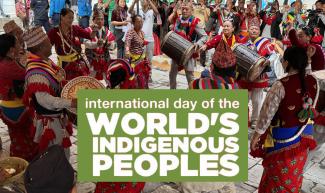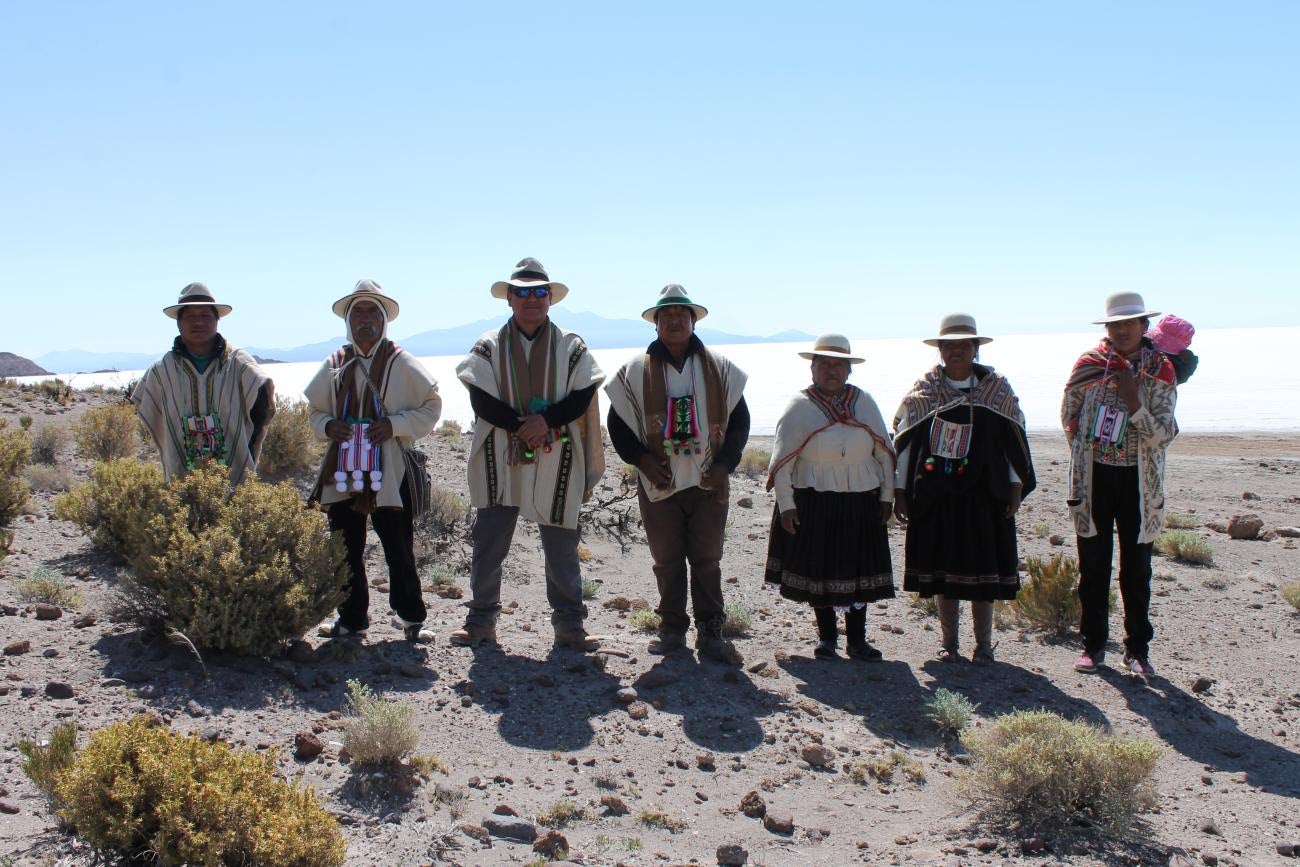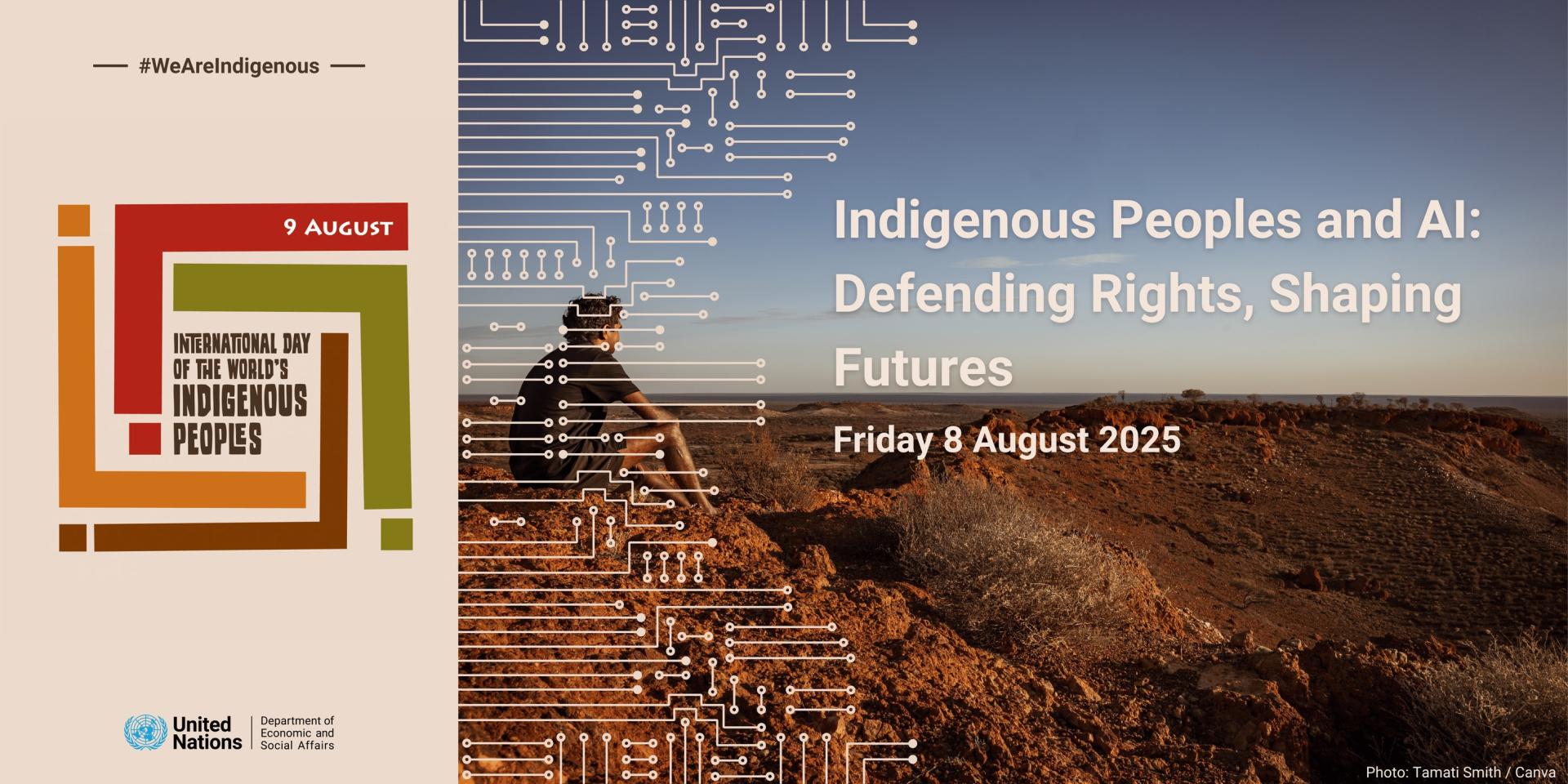4 Calls to Action for International Day of the World’s Indigenous Peoples 2025
10 Agustus 2025agnes

Today is International Day of the World’s Indigenous Peoples (August 9). Every day, we honor the sovereignty, richness, and beauty of Indigenous Peoples, languages, and lifeways.
The first meeting of the United Nations Working Group on Indigenous Populations was held in Geneva, Switzerland, on August 9, 1982. Since then, many spaces have opened up for Indigenous voices to be heard, and new agreements protecting the rights of Indigenous Peoples have been adopted. While we celebrate these outcomes, we also recognize that the promise of human rights for Indigenous Peoples worldwide remains unfulfilled. In many parts of the world, Indigenous Peoples are still facing grave human rights abuses and challenges.
This year’s theme is “Indigenous Peoples and AI: Defending Rights, Shaping Futures.”
As our Executive Director, Aimee Roberson (Choctaw and Chickasaw) says, “Indigenous Traditional Knowledge systems are grounded in place and developed over many generations, hundreds, sometimes thousands of years. Indigenous Knowledge is shared and verified in community and governed by traditional systems that respect all life and Mother Earth and accept our responsibility to care for each other. This is Indigenous intelligence because we know that we are all interrelated and that one of us cannot thrive unless we are all thriving. Artificial Intelligence is scraping information from all over the internet, stealing intellectual property and images, often without attributing their sources. It’s full of bias, unregulated, and has the potential to cause a lot of harm in the form of completely leaving out Indigenous perspectives and knowledge, in the form of appropriating our knowledge without consent, taking things out of context, and creating misunderstanding. Artificial Intelligence is being used for surveillance. The biases, the gaps in knowledge, and things we don’t understand are used to make decisions that harm people. It’s possible that AI could be used in a more thoughtful and respectful way if Indigenous people are included in every step of the process….Data sovereignty is critical.”
We call on states, policymakers, and corporations to:
- listen to Indigenous people and respect Indigenous sovereignty;
- uphold and implement the United Nations Declaration on the Rights of Indigenous Peoples;
- protect the ecosystems we all depend on;
- include Indigenous Peoples in shaping the future of technology;
- support land back initiatives allowing Indigenous Peoples to reclaim and steward their homelands; and
- find real solutions to the climate crises that don’t just greenwash increased energy consumption.
Indigenous Peoples, our values, and knowledge systems hold solutions to today’s greatest challenges, including climate change, ecocide, and biodiversity loss. But all too often, we are not listened to, consulted, nor given seats at the tables where important decisions that impact us are being made.
At Cultural Survival, we are working around the world and around the clock to support the priorities of Indigenous Nations and communities that are protecting Mother Earth for generations to come and for the millions of people, plant, animal, and mineral relatives that share our homelands.
4 Calls to Action for International Day of the World’s Indigenous Peoples
1. Know the Facts about Artificial Intelligence!
Artificial Intelligence is not “intelligence.” You can’t build an AI without the data. Energy consumption by data centers is so astronomical that their existence would foreclose the possibility of ever reaching carbon emission goals.
Read: Refusing Artificial Intelligence and Nuclear “Manifest Destiny”
Read: Indigenous Peoples and AI: Defending Rights, Shaping the Future of Technology
2. Share the Statistics!
Support Indigenous communities who are facing threats from mining for transition minerals, AI data centers, and nuclear energy development.
Three years ago today, Cultural Survival, Tallgrass Institute, Batani Foundation, Earthworks, Voices
Recent statistics:
Indigenous territories contain significant amounts of untapped heavy metal reserves around the world, putting Indigenous lands and communities at risk.
-
Indigenous communities continue to be disproportionately impacted by mining for transition minerals, as 54% of deposits are located on or near Indigenous Peoples’ lands and territories. With 18 new cases of reported impacts on Indigenous Peoples and 77 across all years, Indigenous Peoples are negatively affected by an unchecked acceleration in mining for transition minerals.
Every day, Indigenous leaders risk their lives to protect their territories from mining.
- Some 835 allegations of human rights abuses have now been linked to the mineral extraction of these minerals since 2010, including 77 linked to Indigenous Peoples’ rights, including 48 cases of abuse of the right to Free, Prior Informed Consent.
- In 2023, 49% of murdered environmental or land defenders were Indigenous or Afro-descendants, a disproportionately high figure given that Indigenous Peoples comprise roughly 6% of the global population.
- In 2023, 41% of attacks against Indigenous Peoples were related to mining.
Governments and companies must observe and implement the rights of Indigenous Peoples, including the right to Free, Prior and Informed Consent, outlined in the United Nations Declaration on the Rights of Indigenous Peoples.

3. Share Stories from Impacted Indigenous Peoples!
Listen to radio programs and podcasts on the impacts of transition mineral mining and the SIRGE Coalition in English, Spanish, Quechua, and Nahuatl from Cultural Survival’s Indigenous Rights Radio.
Read about how mining for transition minerals is affecting Indigenous communities.
- Honoring Lost Lands and Defending the Future: Sámi Youth Resistance in Kiruna, Sweden
- Science and Tradition Unite to Fight a Giant Copper Mine in Ecuador
- A Rebel Priest, A Crusading Lawyer, and A Canadian Mining Company
- Indigenous Water Defenders Take on a Canadian Mining Giant
- Cassiterite Mining in Lemera: A Fight for Pygmy Land Rights
- Tabanok Audiovisual School Amplifies Inga and Kamëntsá Voices Against Extractive Industries in Colombia
- Mining Boom Leaves Indigenous Batwa in Poverty
- Indigenous Voices Rise Above the Din of Mining in North Sulawesi
- Free, Prior and Informed Consent: Youth Fellows Fighting for Indigenous Rights
- Indigenous Peoples and the Car Industry: How Hyundai Harms Indigenous Peoples Throughout the Americas
- ‘Canadian Companies Destroy in the Name of Canada’
- Bullets and Beatings Support Canadian Mines
- Sámi People Oppose Copper Mine in Norway
- Strengthening Bonds to Resist Lithium Extraction: Pankararú-Pataxó Peoples in Brazil
- Indigenous Resistance to a Made-in-Canada Mine
- A Canadian Mining Giant vs. the Guardians of the Amazon
- Resisting Lithium Mining and Strengthening Food Sovereignty: Quilombola Community in Girau, Brazil
- Destroying Green to Produce “Green Futures”: Seeking Alternatives to Copper Mining through Community-led Tourism Plans in Panama
- Stop Ambler Road: The River Is Our Bread and Butter
- Minahasa’s Cry: Indigenous Voices Rise Against Mining Onslaught in Indonesia
- Tahua’s Visions for the Future: Fighting for Community Tourism over Lithium Extraction
- The Road to Tahua: Journeying to Heart of the Lithium Triangle via Sacred Salt Flats

4. Learn more about International Day of the World’s Indigenous Peoples!
The annual International Day of the World’s Indigenous Peoples launched with a virtual commemoration on Friday, 8 August 9am EST!
This year the theme of the International Day of the World’s Indigenous Peoples is “Indigenous Peoples and AI: Defending Rights, Shaping Futures”
Watch the recording here.

